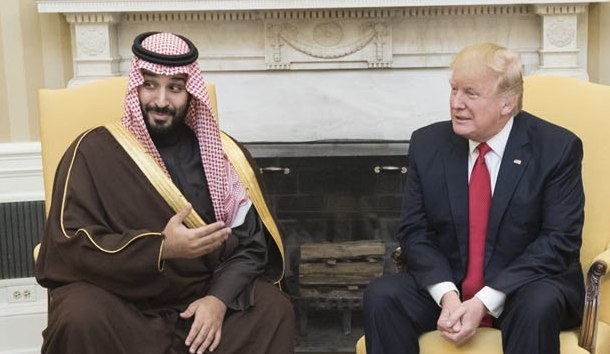President Donald Trump does not want to be goaded into war with Iran, which is wise. He does not want to appear weak in the aftermath of the attacks on the Saudi oil installations–for which Iran has been blamed by Secretary of State Mike Pompeo (“an act of war”), and others–which is understandable. By inviting the Saudis to declare their non-binding casus foederis he has found the way out.
If the analysis is right, Trump–guided by his instinct, or by superbly realist calculus (which luckily may amount to the same thing)–appears to have given Prince Mohammad bin Salman (MbS) the opportunity to escalate, while knowing that the Saudi royal will blink.
MbS did blink, knowing full well that his desert kingdom would be toast if the crisis turns into a real war. As the Wall Street Journal has pointed out, among others, the Saudis have stopped short of explicitly accusing Iran of conducting the strikes for a good reason. They are big spenders on top-notch weapons, but their military is no good. Both key arms (ground and air) are tactically incompetent, as demonstrated in Yemen, and the Kingdom’s only source of revenue is wide open to Iran’s thousands of incoming missiles.
The Saudi prince, a nasty piece of work, murderous and unstable to be sure, has stopped short of trying to wag the dog. His untested generals fear upping the ante because they cannot follow up any explicit accusation of their Shiite neighbor across the Gulf with a sanguine response–unless they are assured that the U.S. military will take care of the consequences. There is no such assurance.
There is a historical parallel, in reverse.
Back in 1914, Austria-Hungary–a distinctly weak partner of the Kaiserreich–was authorized by Germany–the dominant power–to present Serbia with an impossible ultimatum. Vienna received a blank check from Berlin (July 5) to proceed as she deemed fit, because the would-be hegemon, Germany, believed this was an opportune time to alter the European balance to her favor once and for all. The result was a tragedy of world-historical proportions.
The difference now is that Trump does not want war. He understands that the cost would be prohibitive–not least to his reelection prospects–and the geostrategic advantage to the U.S. marginal at best. No Middle Eastern war fought over the past three decades has made America safer, or more prosperous, ever. Trump wants to weaken Iran by an ever-tighter sanctions regime, but he also wants to cajole its rulers into a dialogue on his own terms without the bombs. This is an eminently realist strategy.
Trump is not a warmonger on steroids (think Bolton), he is a deal-maker. He sees the attack on Saudi oil installations–which do have an Iranian footprint, wherever the missiles came from–as a welcome opportunity to tighten the sanctions regime to the point where the mullahs will cry uncle and start behaving more in accordance with the regional balance-of-power framework the President seems to cherish. We still do not know whether he has a grand-strategic design, but he would not have acted differently if there had been one. This is a comforting thought.
PS: George Friedman’s “U.S. Military Options in Iran” (October 17) is a disappointing read. The man often described as America’s foremost geostrategic analyst rightly points out the dangers and weaknesses of various scenarios of attacking Iran–the country twice the size of Iraq, with 82 million people–only to come up with the suggestion that the U.S. should attack Iran’s “proxy” Hezbollah instead.
Having toured southern Lebanon’s Hezbollah country in extenso last year, I am left wondering why Friedman has not thought this suggestion through.



Leave a Reply